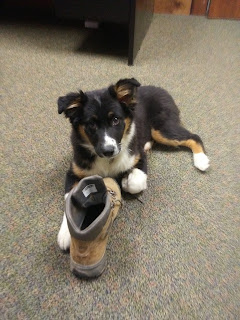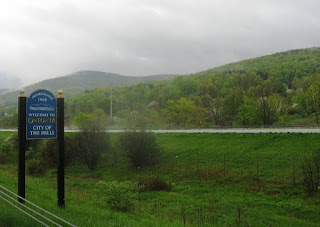For years, while I was teaching at a mid-sized college in upstate New York, I sat politely through Monday afternoon Faculty Senate meetings, taking notes and looking attentive. But my mind was elsewhere. I hated being stuck in those meetings, especially on winter days when the sun was setting and I knew I was missing the best crepuscular light, would be stuck walking home in the cold, boring dark. I tried to make the best of it, plastering a faint smile on my face and spending most of the time memorizing poems -- Mary Oliver, Gary Snyder, Robert Service. While others gave finance reports or revived perennial complaints about teaching evaluations, I daydreamed of geese and granite ridges, succumbed to "The Spell of the Yukon." Blah blah, department enrollment, dining hall options,... Yet somehow life’s not what I thought it, / And somehow the [tenure] isn’t all.
####
Puppy and I now live in the great, big, broad land ’way up yonder. After years of dreaming of moving to Alaska, I finally made the big move, not so much piking to the Yukon as packing up and driving/taking a ferry/driving to Fairbanks. In November. (The month before winter sets in is a perfect time to move to interior Alaska, of course.)
We've been here for nearly two months. Like every Sunday afternoon, we just took a 2 hour long romp through the forest -- my eyelashes and her whiskers freezing in the crisp, still air; snow all squeaky underfoot; early winter sun barely high enough to illuminate the treetops; one cackle of raven but no other signs of life.
Now we're nestled back inside my cozy little cabin, with blankets and warm socks and a mug of hot cocoa on hand -- the epitome of hygge.
####
It doesn't seem like a place meant for comfort, though.
It's dark.
Lightish out from about 11 to 3, nighttime until 10 and by 4. I've only seen the actual sun above the horizon once in the past few weeks, and even then, it was cheating (and brief), driving over hilltops. I constantly cycle through 2-3 headlamps, each of which only lasts 10-15 minutes before fading then quitting due to cold.
It's cold.
Last I checked, the thermometer read -28 degrees Fahrenheit, with windchills forecasted for -60. (When yesterday rose to -16, I caught myself thinking, "Oh, it's warm out today.") Last week, I was farther north -- above the Arctic Circle, in fact -- and the truck said it was -38 out (though we weren't sure if the thermometer had just bottomed out at that point.) At -40, Celsius and Fahrenheit match and degrees don't really seem to matter anymore.
The winter! the brightness that blinds you, / The white land locked tight as a drum, //The cold fear that follows and finds you, / The silence that bludgeons you dumb.
My cabin's only defense against the cold is an efficient little Toyo stove (quite common up here), which runs on fuel oil but needs electricity to fire. The power flickers out a few times a week, leaving me at risk of freezing and an expert at resetting clocks.
Puppy keeps getting ice balls in her paws, but that's her own fault for repeatedly tearing off her protective booties.
Every time I go outside, I have to put on socks, mittens, boots, a hat, at least one coat, and usually snowpants.
I have to go outside fairly frequently, for I live in a "dry" cabin -- no running water. Jugs. An outhouse. The sink drains into a bucket. There are several places in town to get water -- some people fill huge tanks on the back of their trucks -- but I've just been melting snow. My pasta often contains a few errant pine needles.
It's a 4 mile walk to work, first through a snow-laden forest, then along a stretch of icy road (or, if there's a lot of traffic, a deep but safer ditch), followed by 2 miles of what I think are bike paths, criss-crossed with tracks from fat bikes, snow machines, and moose (moose!!), finally another stretch of icy road. At least I don't have to burn through all of my headlamps, because most of the way is brightly-illuminated by light pollution. Oh, and it reeks of vehicle exhaust. Fairbanks boasts more poor air quality warnings than windchill advisories.
"...You hate it like hell for a season, / And then you are worse than the worst..."
I much prefer walking to work, though have to drive everywhere else. Like many western towns, Fairbanks never seems to have suffered any semblance of urban planning, just sprawled into a giant network of highways. All roads are permanently iced over. I have to scrape off my windshield every time I want to drive. I had my truck winterized (i.e. outfitted with special heaters that keep things like the battery warm when I plug them into an outside outlet) but no one warned me that my extension cord would freeze into a giant tangle of loops. All of my tires are flat.
Luckily, gas is cheap. Food, however, is expensive. Plus, it's hit or miss whether fruits, veggies, cheese, and basically anything will be in stock much less fresh. I suppose I'll have to learn to fish and hunt. Only about 7 months until berries should be ripe!
"...It grips you like some kinds of sinning; / It twists you from foe to a friend; // It seems it’s been since the beginning; / It seems it will be to the end."
####
All this to say: I absolutely love it here thus far. The freshness, the freedom, the farness— / O God! how I’m stuck on it all.
I love how the snow squeaks, love how the trees wobble, love how the light barely hits distant hills. I love how puppy gets little whiskercicles, how my face freezes over but my toes stay warm, how I'm forced to go outside when it's 2 a.m. and nearly -40 degrees Fahrenheit (or Celsius) and I have to pee, only to get to see the most magnificent aurora shimmering greenly through the sky. I love how mountains sit on the horizon, how inversions turn them into mirages. I love how the profile of Denali pops out everywhere. I love that my job entails driving north of the Arctic Circle.
I've never in my life felt so eager and overjoyed for a solstice.
####
So much to learn!
First, cold, personal-scale.
The afternoon we arrived here was a grey and somewhat humid 17 degrees. I couldn't stop shivering. The first time it dropped below 0, I wore every single one of my layers and sweated buckets. The first time I walked to work below -20, I wore every single one of my layers and still sweated buckets. The first time it dropped below -25, I was sure my truck would never start again, but it coughed right to life. The first time the thermometer read -36, I thought my lungs would freeze when I stepped outside, but they didn't even burn a little. Lesson being: you get used to the cold. Not to say that I enjoy -28, poor little Toyo pumping away, but now -8 feels like a heat wave.
Next, landscape-scale cold.
Instead of the typical lapse rate, which keeps higher altitude air pockets and land surfaces colder than lower altitudes, inversions rule here. Hilltops are warmer, as cold, dense air sinks and settles into the valleys. Even more importantly, local topography rules, with relative elevation key. I live on the side of a hill, technically higher than downtown, but lower than a circle of surrounding domes, so I'm stuck with a cold bubble of air. It's often 10-15 degrees colder here than at work. Driving the Dalton Highway, up and over several ridges and down into valleys, temperatures range from 10 degrees (above zero!) on the summits to -30 or less near the very frozen rivers. Plus, the size of the valley matters, or rather the size of the area from which it drains cold. Instead of a watershed, it's a coldshed, with local topography of far more importance than latitude or elevation.
Speaking of cold: ice.
Ice does weird things here. River surfaces freeze, but can keep running and force their way up behind ice dams, creating layers of "aufeis". Lake surfaces freeze, too, but if enough snow falls, it can weigh down the frozen surface, pushing the ice into the water and creating "overflow." Puppy and I learned this one during one very mushy walk across what I thought had been a solidly frozen pond. Yet, ice and, better yet, snow, are the way to travel. It's infinitely easier to shuffle or glide across the surface of a frozen stream or along a neatly snowpacked trail than to wobble through tussocks or weave through sprucey bogs.
In part, that's why all of the rivers and tributaries are packed with place-names, while many of the summits remain nameless. When navigating through this region, only a few of the most prominent peaks are of any help; it's the water that matters. Also, high hills are called "domes" -- Ester Dome, Murphy Dome, Wickersham Dome. No one seems to know why.
####
Even in 2022 (soon to be 2023), There’s a land where the mountains are nameless, / And the rivers all run God knows where.
It's all still so big. And so wild. How could any other place compare?
I came to the Arctic 4 1/2 years ago, out of some naïve, desperate hope to experience wildness and the sublime. I found myself deep in a land far beyond my dreams or nightmares -- a huge, powerful place full of "freshness" and "freedom" and "farness", where lives are "erring and aimless" and, yes, deaths "just hang by a hair."
I barely survived, humbled and terrified.
Enchanted.
There’s a land—oh, it beckons and beckons, / And I want to go back—and I will.
####
Turns out, those Faculty Senate meetings were invaluable, after all. Thanks for the time spent memorizing Robert Service:
It’s the great, big, broad land ’way up yonder, / It’s the forests where silence has lease; //
It’s the beauty that thrills me with wonder, / It’s the stillness that fills me with peace.




















.jpg)








































